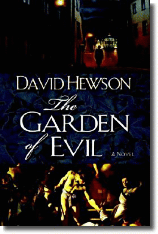 David Hewson is the author of the Nic Costa series of novels set in contemporary Rome. A former journalist with the London Times and Sunday Times, his work has been translated into many languages, including Chinese, Japanese, Thai ... and Italian.
David Hewson is the author of the Nic Costa series of novels set in contemporary Rome. A former journalist with the London Times and Sunday Times, his work has been translated into many languages, including Chinese, Japanese, Thai ... and Italian.He applied the “Page 99 Test” to the latest Nic Costa novel, The Garden of Evil, and reported the following:
It's very easy to understand what's going on when you get to Page 99 of The Garden of Evil. We have by this stage come to realise we've come upon the bad guy. He's going to be hard to nail. But before I establish that fact I want you to know who he is and where he comes from. Crime and thriller fiction is about the meeting of good and evil, and it's important for me to establish that both are real and both are linked. I loathe the idea of people being 'born bad'. They're made bad by something, and here you start to get an insight into what has made the nasty Count Malaspina what he is.Read an excerpt from The Garden of Evil, and learn more about the author and his work at David Hewson's website.
This section also establishes the book is not a whodunnit. Can I shout that loud enough? If you're looking for some standard format, off-the-shelf mystery in which the villain is mysteriously revealed on the last page, please go elsewhere. There are surprises aplenty and twists galore, right to the end. But the identity of the perpetrator is not one of them. I am much more interested in 'why' than 'who', since the latter seems to me to be a question that locks one into a format we know only too well.
From Page 99:
He was a true Roman aristocrat of a dying breed, and came from a family with unusual antecedents. Unlike most of the city's nobility, the Malaspinas had embraced the era of Mussolini, seeing in the dictator opportunity and not the coarse, proletarian Fascism most other ancient families detected and instantly despised. His grandfather had served as a minister for Il Duce. His father had been a rabble-rouser on the fringes of right-wing politics, and consequently had been loathed in Rome, a city that was temperamentally left-leaning, until his death in a plane crash five years ago.
Costa had no recollection of Franco Malaspina being involved in machinations around the parties that formed the continuing, argumentative coalitions at the heart of the Italian state; only the vague memory that he was a notorious player in the money world, one who sailed so close to the wind that the financial authorities had investigated him more than once. Not that these probes had resulted in any form of action, which meant that Malaspina was either innocent or so deeply powerful no one dared yet take him on. There were good reasons for caution. Men of his sort liked to build up fortunes before turning to the Senate and Parliament to lay wider, deeper foundations for their power.
See the Page 69 Test for the previous Nic Costa novel, The Seventh Sacrament.
--Marshal Zeringue



